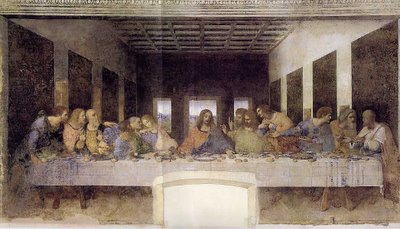Jesus' Prayer (John 17)

Myron Augsburger wrote a piece in the MWR (Dec. 5, 2005) entitled, In Praise of Christian diversity. He writes, "Mennonites have a subtle spirit of condescending exclusiveness. We tend to regard other Christians as inferior and miss out on an inclusiveness that could enrich us."
He goes on to say, "We do accept a limited measure of ecumenicity. We borrow a few patterns in worship and liturgy, but very selectively--accepting either what is too popular for us to miss or what we deem best suited to our spiritual formation."
Augsburger says, "We need an ecumenical spirit that is distinct from ecumenical organization."
I guess I would start there in my answer to your question. I am homesick for a view of the church that is inclusive--yet does not sacrifice a commitment to the Faith we have received. Like Paul, could we say, "that which I received I passed on to you." Or have we become too skeptical, too formed by Modern Enlightenment to be able to believe that the Scriptures and the worship of the Church are more than just something we make up, or interpret, or create as we see fit or as makes sense from our lens.
In my class Tuesday night, Brinton Rutherford noted that Christian theology of the classical era says, "God exists." God is the subject period. After the Englightenment, with the radical shift toward individualism, theology says, "I think God exists." "I" is the subject and God is the object. So we have moved from thinking of the architecture of Theology as Dogmatics, or even Systematic Theology. We see theology moving toward more of a "Constructive" formulation. We do theology (God words, God thoughts) from the bottom up, not from God down. We begin with our experience and try to explain God through that lens. We are skeptical of anything that begins with a foundation in revelation. Because of course the interpretation of that revelation depends on the perspective and experience of the individual.
This has been one huge sidebar to the question of "expressions of division." I believe that when Jesus was praying that we (the Church) would be one, just as the Father and he are one he meant a oneness that is deep and even spiritual grounded in wholeness and truth. I don't think Jesus was praying for a superficial oneness.
I write as one whose own views have shifted. Whereas at one time I would have looked with skepticism and eyes of superiority on believers outside of the Anabaptist/Evangelical/Charismatic stream... I have come to see that the Spirit of God is at work throughout the whole Church. My prayer is that we would work toward reconciliation, unity, and a true understanding of the Church.
In my own emerging theology, I sense a movement toward a more inclusive ecclesiology, that allows for the possibility that we (our church, our denomination, our historical stream) does not have the sum and total of truth and/or the way of faithful worship and witness. I pray that we could join our "distinctives" together with the whole and perhaps not even view them as "ours." Could we let go of the need to define ourselves as seperate from the whole, or distinct in some way. I know this is not possible outside of the working of the Holy Spirit, for history has created some real rifts and tensions that cannot be minimized. But could we allow ourselves to believe that the Holy Spirit is at work to bring about the fulfillment of Jesus' prayer that must be owned as the eschatalogical reality we are moving toward when all things will be brought together in Christ.
There are dialogues going on that are signs of hope. The dialogue between Anabaptists and Catholics. The dialogues between Anabaptists and Orthodoxy.


4 Comments:
At 6:51 PM , Anonymous said...
Anonymous said...
I really want to think more about this:
"We begin with our experience and try to explain God through that lens. We are skeptical of anything that begins with a foundation in revelation. Because of course the interpretation of that revelation depends on the perspective and experience of the individual."
I agree with your post on different points. One being, I, too, long for more unity across faith traditions. There is something enriching about discovering those practices and pieces of worship which bear deep meaning and strength in someone else's soul and faith. I also agree with your point lately, we too often look at God from the bottom up rather than starting at the top, what we know of God himself, and living life based on that.
I just wonder, however, how do we get around the reality that humans do interpret revelation or any experience for that matter, based on their perspective and other experiences in life. Yes, we have a chance for a broader perspective because we have over 4,000 years of stories and history from which to compile our understanding of God and His desire for the Church. But the writers of Scripture had very different experiences of God, church and Christ. And I'm sure that other cultures of their time which also heard prophesies of the Messiah or heard the Good News from the Apostles added their cultural interpretations/emphases to the attributes of God about which they learned, worshipped and lived by. Whenever I am in a conversation about what God is like or how we should live (or worship), I often hear people say things like, 'you need to always go back to Scriputure!' I agree, but even the Orthodox Church does not use the same canon as the Catholics or the Protestants. Why? Why can't we even agree about what writings, revelations if you will, can or can't be used to help us see the Truth? How can unity be built on or despite basic disagreements on revelation? I suppose you will say, but for the power of the Holy Spirit. I know, but my HUMAN EXPERIENCE says, humans are too territorial to allow the HS to build bridges. In other words, like you said, we are too skeptical of revelation, maybe because we don't trust human interpretation.
Oh dear, I am sounding, once again, without hope. No, I just know that unity is truly a miracle, a beautiful piece in the picture of God's redemption. Maybe the answer is in Augsburger's idea of ecumenical spirit vs. organization. I feel frustrated because I am looking for the answer in organization (how can we blend these practices into a "right worship" we all follow?) rather than hoping for a new spirit. God has proven time and time again he can change hearts. Openness starts there. So back to Scripture . . . 'Faith is the substance of things hoped for . . .'
At 8:06 AM , Anonymous said...
Anonymous said...
Sorry, one more question(s)!
I read the MWR article about rituals. Why is it that from little on up, I heard my father complain about the rituals in the Lutheran and Catholic churches (the churches where his parents were raised)? He would say they had no meaning. He would insinuate they were idols in worship. I have also heard people say "rituals are dead." Is this because the rituals become outdated? I doubt we would say that, would we? Or is it good to change rituals so that they have meanings that meet the needs of the changing times? (Perhaps that would negate the idea of "ritual"!) What does it mean to give rituals a fresh new meaning or to revitalize them? How can we keep them from growing old and meaningless once again? Or is it all a matter of the heart?
At 8:15 AM , Anonymous said...
Anonymous said...
Sorry, in my last comment, I did not mean to say "meet the needs of the changing times" (I got interrupted in my thought). I think what I mean to ask is whether or not rituals are the kind of things which are more meaningful if they are relevant to where people are coming from, or is it more true to say that rituals stand the test of changing times and are the part of worship that does not ever change (thus the term "ritual"?
At 12:27 PM , Brian Miller said...
Brian Miller said...
dml,
I guess one question I would have in response to your questions/reflections is this: who determines the meaning that rituals have? Are we as individuals free to change any ritual so that it has meaning for us? Let's take marriage for example. There are certain rituals that are a part of Christian marriage (language and symbols). Are we free to do whatever we want to with these rituals to meet the sensibilities of our time?
You raise the point of rituals being meaningful if they are relevant to where people are coming from. That raises several questions. While there are important considerations to looking through the lens of anthropology of missions-I'm wondering what weight should be given to being "relevant." How much does the Gospel call us out of the spirit of the age? If I try to make the Gospel (and worship) relevant to the spirit of the age (individualism, rationalism, materialism,etc.)will I not end up distorting and watering down the Gospel and worship. I'm not saying that we don't attempt to communicate the Gospel and invite people to worship in their own cultural flavors, but I am suggesting that there are certain elements of the Gospel and worship that transcend these particularities. The question is, of course, how does one distinguish between what is normative for all cultural contexts and what can be reframed/translated into the idiom of the day.
Good questions dml. You are obviously someone who has experience with the anthropology of mission and the questions that we are asking.
Post a Comment
Subscribe to Post Comments [Atom]
<< Home